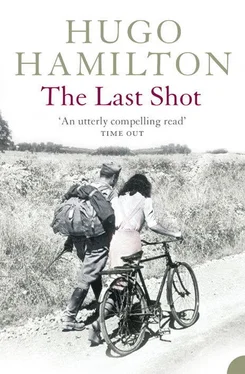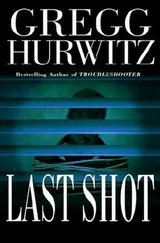On the wall of the kitchen hung a wooden plate with an egg-cup, spoon and a child’s cup glued to it. Jürgen usually fed Alex when he was home. He showed extreme patience. Alex was limited in what he could chew. He got distracted and he wanted to eat from Jürgen’s plate or from my plate instead. Jürgen and Anke never talked about him in the third person when he was present. Jürgen held out the cup and Alex sang or sighed noisily as he drank. When he finished, there was a milk moustache on his upper lip.
After dinner I gave Alex the spinning top. It drove him mad. At first he got very excited about it when Jürgen spun it for him. But then he tried it himself and the handle broke off. He began to wail. Jürgen took him on his knee while I fixed the spinning top. But Alex was tired. He kept crying. I could see the full extent of his deformities; the pronounced cast in his eyes, the ill-fitting teeth and his inability to understand.
Bertha Sommer never saw the hostages being released. She never caught sight of their faces or of anyone getting off the trucks in Postelberg. All she saw were the onlookers in the streets and the occasional glimpse of purple lilac in full bloom as the trucks moved on again. The summer had come. It was hot on the trucks, under the green tarpaulins, as they drove out of Czechoslovakia. At times the trucks were hit by a shower of rain, but the sun quickly came out again. There was a smell in the trucks, like the inside of a marquee tent. There was also a constant smell of diesel.
After Postelberg, things moved slower than ever. Sometimes the pace was reduced to no more than five or ten kilometres an hour. Every conceivable form of transport was out on the roads, every available set of wheels; carts, barrows, prams, on the move. Outside Postelberg, they were held up for almost an hour.
The German units from Laun were determined to stay together as one convoy. Everywhere, Sudetenland civilians attached themselves to the retreat, getting in between the trucks, sometimes separating part of the convoy. Whole families were fleeing to Germany. Families pleading to be taken on the trucks. They knew what was going to happen. Bertha Sommer saw crowds of women and children, some of them leading farm animals. Some of the women carried enamel buckets for suitcases. The roads were stuffed with people fleeing, carrying as many of their belongings as they could, afraid to look back, afraid to think of what they were leaving behind. Bertha was the same, she had also left things behind, things she couldn’t carry.
The streets were full of mud too. And full of rumour. The whole of Europe was full of rumour. On the trucks, it became clear that the Russians were trying to close off the escape from the north. The retreating army was trying to make it to Eger on the German border as quickly as possible, but the pace of the streets made it difficult.
On 9 May the Soviet Army had all but caught up with them. The soldiers at the back of the truck spotted them behind. At the edge of a valley, they could see the densely packed road curling through the trees and emerging on the opposite side of the valley behind them. Officer Kern handed Bertha the binoculars and she could see, with great shock, the first Russian tanks and armoured cars in pursuit. Binoculars show exactly how close you can be.
Everybody on the truck began to talk at the same time. Officer Kern silenced them and said the Russians would never catch up. The roads were too clogged. As long as the Germans were not held up somewhere along the road ahead, there was no danger. Besides, there was too much mud everywhere. The tanks could never cross through the fields.
By the time they reached Eger, the following day, they were safe. They abandoned the trucks. It was part of the terms of surrender that all military equipment was to be left behind at the border. The Americans at Eger would not have let them through on trucks either.
The Wehrmacht began to disintegrate. Bertha and Officer Kern got down from the truck and set off on their bikes. The soldiers all laid their weapons down by the side of the road. There were piles of helmets like mounds of skulls. Most of the personnel, like Officer Kern, changed out of their uniforms into civilian clothes. They rolled up their uniforms and placed them under bushes, behind walls, anywhere along the route. A few of them, like Kern, held on to their hand weapons, concealing them among their belongings, just to be safe. Many of them kept their boots. Where would you get boots as good as German army boots?
Officer Kern asked Bertha to drop the title of Officer. From time to time she still involuntarily gave him that prefix as they cycled through Eger. They passed a large refugee camp outside the town on the German side. They saw the American troops who were stationed in Eger and who let the retreating Germans pass freely. There were too many of them to stop.
By the time they reached the foot of the Fichtel mountains, Bertha Sommer knew everything there was to know about mud. It clung to her shoes and to the tyres of her bike. She knew mud in every stage of its composition, how it dried and fell off in lumps from the wheels of prams and carts. She had seen thousands of footprints and wheeltracks.
The sun in May 1945 quickly dried the tracks.
Franz Kern and Bertha Sommer headed for the hills. They were trying to get off the main roads as soon as possible. From now on there were new dangers. Angry Czechs and Poles returning home in the opposite direction. The main roads would be treacherous. There would be thieves. There was nobody you could trust. A bicycle was like gold. In May 1945 it was like owning a ranch. Defending it was like a war in itself, a cold war at least.
They went as far into the Fichtel hills as they could. ‘The first German afternoon,’ Bertha wrote in her diary when they stopped to rest. It was written in bold handwriting in the evening when they had put sufficient distance between themselves and the main German retreat. They had reached a height from which they could see the traffic crawling along the road. It never stopped; even after 10 in the evening, when darkness fell, the horns and the lights passing along below them went on.
They had stopped because Bertha was exhausted. She had no energy left. She needed to sleep. Here in the first elevation of the Fichtel mountains, they could take a rest knowing that there was less danger of being attacked or getting their bikes stolen. They ate some black bread, sitting with their backs to tree trunks. They also had some chocolate, the remains of their rations, which was meant to last until they got home.
Bertha’s arms were burning from the sun and began to feel cool after dark. She shivered and put on her coat. She was glad she had insisted on bringing it, even though it made cycling harder in the heat of the day. She thanked Franz for getting her this far. They sat talking for a while; exchanging biographies.
‘Bertha Sommer, born Kempen, four sisters, mother still alive, brought up in a strict Catholic background…’
Most of it was already known. They expanded and told stories about themselves.
‘Franz Kern, married, no children, born Nuremberg, two brothers killed in action, one a pilot…’
Kern hid the bikes under foliage and branches. It took a while. She heard the cracking of twigs and branches. He came back and they talked for a while longer until Bertha began to laugh.
‘Nerves,’ she explained. But she couldn’t stop laughing. She became embarrassed about it. She hadn’t laughed like this since she was a child. Since the Third Reich began. She sat by the tree, chuckling behind the palm of her hand like an elated child.
‘What’s the matter with you, Fräulein Sommer?’ he asked.
‘It’s nothing, I’m just happy,’ she said. She went on laughing uncontrollably to herself, excluding him. Maybe it was the cold night air. It could have been fear. People laugh out of fear.
Читать дальше
Конец ознакомительного отрывка
Купить книгу












